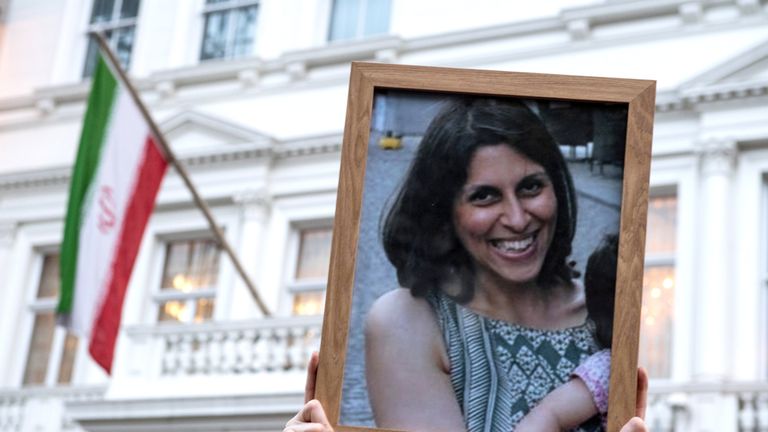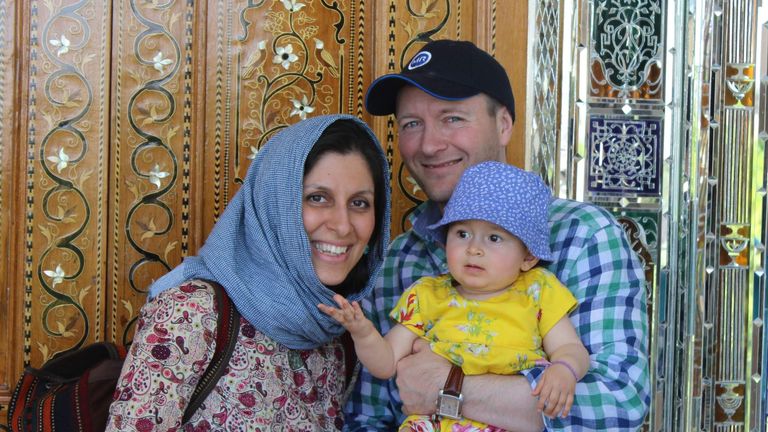Nazanin Zaghari-Ratcliffe: UK to grant jailed mother diplomatic protection to escalate case with Iran

Britain has taken its strongest action yet against Iran over the jailing of Nazanin Zaghari-Ratcliffe by deciding to grant the British-Iranian dual national diplomatic protection.
It is the first time in living memory that the government has invoked this international legal tool in protest at the treatment of one of its citizens by another state.
The move elevates Mrs Zaghari-Ratcliffe’s case from a consular matter to a state issue between London and Tehran.
It comes almost exactly three years since she was arrested at Tehran airport with her young daughter as they tried to return to the UK after visiting family.
She has since been sentenced to five years in prison, accused of plotting to undermine the regime – a charge she denies.
Foreign Secretary Jeremy Hunt admitted he had not taken the decision to grant diplomatic protection lightly.
But he said it “is an important diplomatic step which signals to Tehran that its behaviour is totally wrong”.
Mr Hunt added: “It is unlikely to be a magic wand that leads to an overnight result.
“But it demonstrates to the whole world that Nazanin is innocent and the UK will not stand by when one of its citizens is treated so unjustly.”
The move will most likely trigger an outcry from the Iranian government but it was made after months of deliberation and with efforts to secure the release of Mrs Zaghari-Ratcliffe through the normal diplomatic channels failing to achieve a result.
Mr Hunt said she is “an innocent woman who has spent the last three years in an Iranian jail, separated from her daughter and husband”.
“We have been working hard to secure her release but despite repeated efforts have not been successful,” he said. “So I have today decided that the UK will take a step that is extremely unusual and exercise diplomatic protection.
“This represents formal recognition by the British government that her treatment fails to meet Iran’s obligations under international law and elevates it to a formal state-to-state issue.”
The move was welcomed by Mrs Zaghari-Ratcliffe’s husband, Richard Ratcliffe, who said: “It is a very clear statement and so hopefully the Iranian authorities will realise this has gone on too long.
“They cannot play games like this with ordinary people’s lives.”
Diplomatic protection is different to diplomatic immunity, which is a status under international law that is granted to people accredited as diplomats in a foreign country.
However, it opens up new diplomatic and legal options for Britain, including at the International Court of Justice and at the United Nations.
Diplomatic protection also strengthens the hand of the Foreign and Commonwealth Office to request consular access to the 40-year-old.
Under international law, the UK can only afford diplomatic protection to a dual national whose predominant nationality is British.
The Iranian authorities refuse to recognise the other nationality of dual-citizenship Iranians and have so far denied repeated requests by the UK for a consular meeting with Mrs Zaghari-Ratcliffe.
Mr Hunt has made her case a priority and even travelled to Iran last November to make a personal appeal for her release on humanitarian grounds.
But she remains behind bars and was even deprived of access to medical treatment after discovering lumps on her breast.
Mrs Zaghari-Ratcliffe went on a three-day hunger strike in January to protest at her treatment.
Mr Hunt said: “Iran is one of the oldest civilisations in the world.
“I know there are many in Iran who understand the unjustness of this situation. No government should use innocent individuals as pawns for diplomatic leverage so I call on Iran to release this innocent woman so she can be reunited with her family.”
Richard Ratcliffe, her husband, has been pushing for diplomatic protection for a long time and was told in advance of Mr Hunt’s decision.
Britain will be waiting to see how Iran reacts.
Lord Peter Ricketts of Shortland, a former national security adviser and a former permanent secretary at the Foreign Office, said the British move would send a strong signal though he doubted it would result in freedom for the mother anytime soon.
“I really wish it would because the poor lady has now suffered so long, three years in an Iranian jail,” he told Sky News.
“I doubt it is going to lead to an early breakthrough but I think it signals the seriousness with which Britain is taking the case and that is obviously what is intended – it doesn’t commit us to anything else – but it makes that very, very clear.”
Mr Ratcliffe has said his wife has been told by judges her case is related to money Britain owes Tehran over tanks bought from the UK back in the 1970s but never delivered. The sum is thought to be around £400m.
London and Tehran deny that Mrs Zaghari-Ratcliffe’s situation is linked to this dispute
Britain is thought to have agreed to make the payment but has been unable to do so because of sanctions that the Iranian government continue to be under.
Source: Read Full Article

